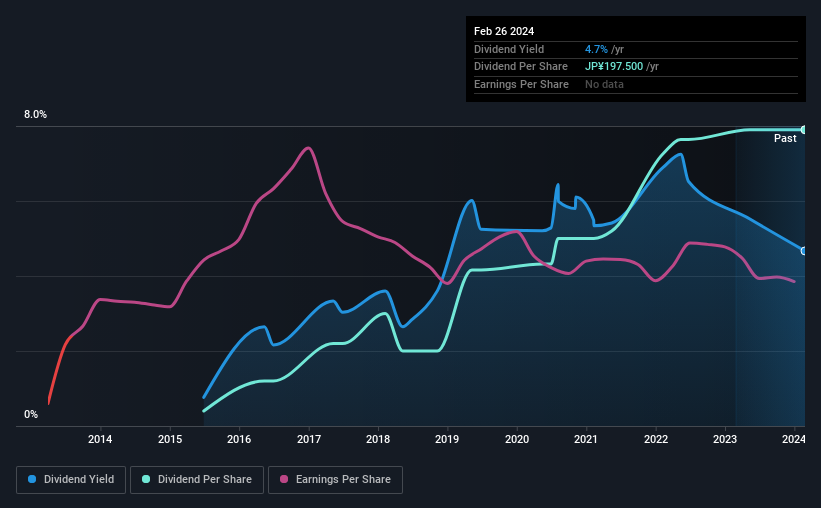- Japan
- /
- Construction
- /
- TSE:1852
Asanuma (TSE:1852) Has Announced That It Will Be Increasing Its Dividend To ¥197.50
Asanuma Corporation (TSE:1852) has announced that it will be increasing its dividend from last year's comparable payment on the 26th of June to ¥197.50. This will take the annual payment to 4.7% of the stock price, which is above what most companies in the industry pay.
View our latest analysis for Asanuma
Asanuma Doesn't Earn Enough To Cover Its Payments
If the payments aren't sustainable, a high yield for a few years won't matter that much. Based on the last payment, the company wasn't making enough to cover what it was paying to shareholders. Without profits and cash flows increasing, it would be difficult for the company to continue paying the dividend at this level.
EPS is set to grow by 0.8% over the next year if recent trends continue. If the dividend continues on its recent course, the payout ratio in 12 months could be 135%, which is a bit high and could start applying pressure to the balance sheet.

Asanuma's Dividend Has Lacked Consistency
Asanuma has been paying dividends for a while, but the track record isn't stellar. Due to this, we are a little bit cautious about the dividend consistency over a full economic cycle. The dividend has gone from an annual total of ¥10.00 in 2015 to the most recent total annual payment of ¥197.50. This implies that the company grew its distributions at a yearly rate of about 39% over that duration. Despite the rapid growth in the dividend over the past number of years, we have seen the payments go down the past as well, so that makes us cautious.
Dividend Growth May Be Hard To Achieve
Given that the dividend has been cut in the past, we need to check if earnings are growing and if that might lead to stronger dividends in the future. Unfortunately, Asanuma's earnings per share has been essentially flat over the past five years, which means the dividend may not be increased each year. The earnings growth is anaemic, and the company is paying out 105% of its profit. This gives limited room for the company to raise the dividend in the future.
The Dividend Could Prove To Be Unreliable
In summary, while it's always good to see the dividend being raised, we don't think Asanuma's payments are rock solid. The track record isn't great, and the payments are a bit high to be considered sustainable. This company is not in the top tier of income providing stocks.
Market movements attest to how highly valued a consistent dividend policy is compared to one which is more unpredictable. Meanwhile, despite the importance of dividend payments, they are not the only factors our readers should know when assessing a company. To that end, Asanuma has 3 warning signs (and 2 which don't sit too well with us) we think you should know about. Is Asanuma not quite the opportunity you were looking for? Why not check out our selection of top dividend stocks.
New: Manage All Your Stock Portfolios in One Place
We've created the ultimate portfolio companion for stock investors, and it's free.
• Connect an unlimited number of Portfolios and see your total in one currency
• Be alerted to new Warning Signs or Risks via email or mobile
• Track the Fair Value of your stocks
Have feedback on this article? Concerned about the content? Get in touch with us directly. Alternatively, email editorial-team (at) simplywallst.com.
This article by Simply Wall St is general in nature. We provide commentary based on historical data and analyst forecasts only using an unbiased methodology and our articles are not intended to be financial advice. It does not constitute a recommendation to buy or sell any stock, and does not take account of your objectives, or your financial situation. We aim to bring you long-term focused analysis driven by fundamental data. Note that our analysis may not factor in the latest price-sensitive company announcements or qualitative material. Simply Wall St has no position in any stocks mentioned.
About TSE:1852
Excellent balance sheet established dividend payer.
Market Insights
Community Narratives



